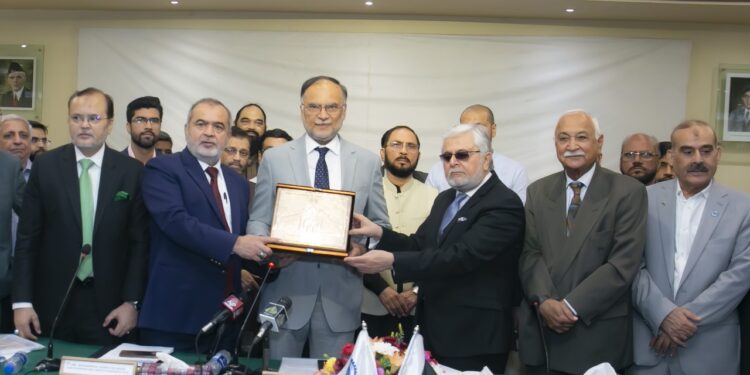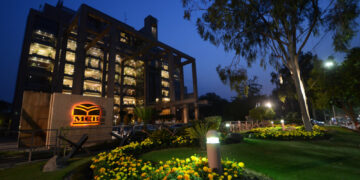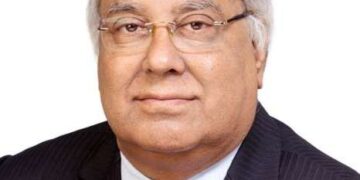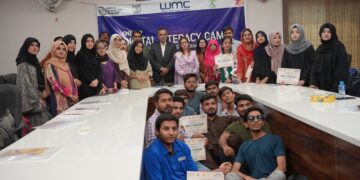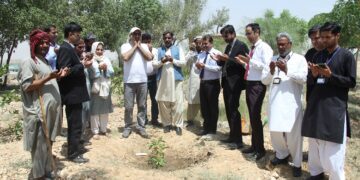KARACHI: Federal Minister for Planning, Development & Special Initiatives Ahsan Iqbal, while underscoring the importance of sustainable export-led economic growth, stated that while rapid growth is achievable through short-term measures, such an approach would ultimately lead to economic instability due to excessive imports and limited foreign exchange reserves.
“We can take immediate steps to accelerate economic growth, but such growth would be short-lived and unsustainable, leading to a boom-and-bust cycle. Instead, we must pursue long-term, sustainable growth that is export-driven,” said the Minister. “If we want to ensure lasting progress, our growth must be anchored in exports, so it is not artificial and prone to crashing.”
Speaking at a meeting during his visit to the Karachi Chamber of Commerce and Industry (KCCI) on Monday, Ahsan Iqbal emphasized the need to build robust foreign exchange reserves to secure Pakistan’s future and self-sustainability. “In my view, the true VIP is someone who earns valuable foreign exchange for the country through exports,” he added. “Not only leading industrialists, but also small and medium enterprises—and even women working from home—must explore opportunities in export marketing.”
The meeting was attended by Chairman Businessmen Group (BMG) Zubair Motiwala, Vice Chairman BMG Mian Abrar Ahmed, President KCCI Muhammad Jawed Bilwani, Senior Vice President Zia ul Arfeen, Vice President Faisal Khalil Ahmed, former Presidents Abdullah Zaki and Iftikhar Ahmed Sheikh, and members of the Managing Committee.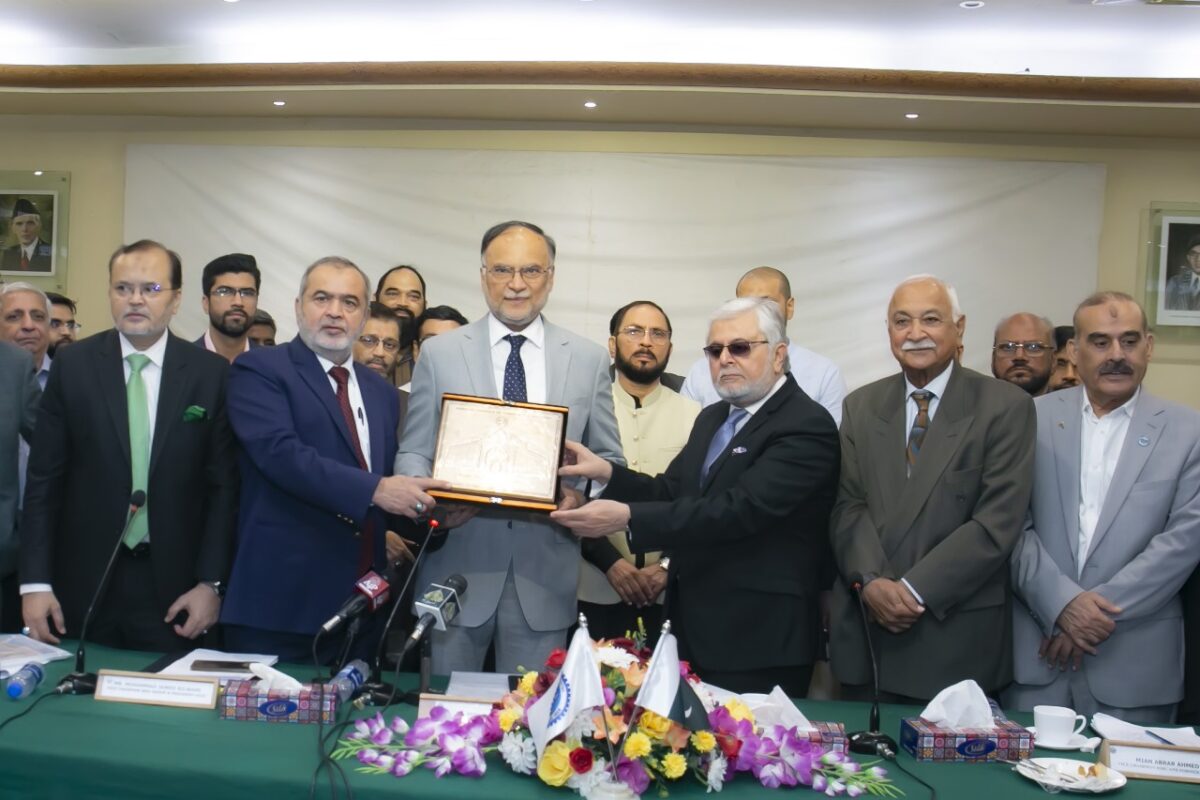

Chairman Businessmen Group Zubair Motiwala and President Karachi Chamber of Commerce and Industry Muhammad Jawed Bilwani presenting crest to Federal Minister for Planning, Development & Special Initiatives Ahsan Iqbal during his visit to KCCI on Monday. Vice Chairman BMG Mian Abrar Ahmed, Senior Vice President KCCI Zia ul Arfeen, Former President Iftikhar Ahmed Sheikh and others are also seen in the picture.
Highlighting the need for transformation, he said, “Every sector must shift its focus to exports. Businessmen should not limit themselves to the domestic market but should actively pursue global opportunities. We must transform Pakistan into an exporting nation.”
Calling upon KCCI to become a key partner in the government’s Uraan Pakistan initiative, Ahsan Iqbal remarked, “Without KCCI’s active involvement as a co-pilot, Uraan Pakistan cannot succeed. We must ensure that this initiative takes off and sustains momentum, unlike many past efforts that crashed over time.”
While highlighting peace, stability, continuity of policies, and reforms as four essential pillars for national success, he cited countries such as India, Bangladesh, Indonesia, Turkey, Japan, and South Korea that have adopted these principles to great effect. “Unfortunately, Pakistan has struggled to implement these pillars consistently. It’s time we commit ourselves as a nation to safeguarding them for economic progress.”
Looking ahead to Pakistan’s 100th year of independence in 2047, he posed a powerful question: “While India may be celebrating remarkable achievements by then, what will we be doing? Will we celebrate with pride or remain stuck in a cycle of ifs and buts? Pakistan has the potential to be among the top five economies in Asia. With abundant resources and hardworking people, we can succeed—if we embrace innovation and change.”
He also introduced the recently launched National Productivity, Quality, and Innovation Initiative, urging businesses to integrate these three elements into their operations. “If we want to become a competitive economy, we must prioritize productivity, quality, and innovation in every enterprise. These elements must become a core part of every business ecosystem.”
The Planning Minister invited KCCI to form sectoral working groups and provide recommendations for boosting exports in key areas, including agriculture, manufacturing, services, information technology, mining, manpower exports, creative industries, and the blue economy. “With focused efforts and the right policies, these sectors can help us achieve $100 billion in exports.”
He also emphasized the need for capacity building within the business community to keep pace with global changes. “If we don’t build the capacity of our entrepreneurs, Pakistani businesses will be left behind in the international marketplace.”
In this context, he proposed the establishment of a Karachi Export Compliance and Innovation Cell under KCCI to support exporters with certification processes, governance compliance, digital customs & trade facilitation training, and a helpdesk to navigate non-tariff barriers in EU, GCC, and ASEAN markets.
Further, he encouraged partnerships with universities and business schools, such as IBA, to drive innovation and entrepreneurial development. “We are ready to provide full support for such collaborations. KCCI should also host seminars on artificial intelligence (AI), which is set to revolutionize industrial production.”
He also proposed that KCCI, in collaboration with the Ministry of Planning, initiate an SME Innovation Fellowship Program. “This program would connect experienced business mentors with promising young entrepreneurs and recent graduates, turning them from job seekers into job creators.”
Lastly, he suggested the formation of a Green Karachi Business Alliance to promote sustainable business practices such as energy efficiency audits, carbon footprint reduction, wastewater recycling, and zero-waste strategies. “Future exports will increasingly depend on sustainability. The time to act is now.”
Chairman BMG Zubair Motiwala, while expressing serious concerns over the lack of implementation of the government’s Uraan Pakistan initiative, stated that although the mission statement and the 5Es introduced under the initiative are commendable, the government has not been able to translate the vision into actionable results. “It has been quite some time since the Uraan Pakistan program was launched, yet it remains confined to papers only,” Motiwala stated. “Why is it not being implemented? Why are people not benefiting? And why is our industry not growing?”
Highlighting the initiative’s focus on enhancing exports, he questioned how the dream of significantly increasing Pakistan’s exports can be realized in the absence of concrete steps. “When will we achieve our export potential?” he asked.
Motiwala pointed to the International Monetary Fund (IMF) as a recurring obstacle in government dealings. “Every time we raise an issue, we are told it’s not possible due to IMF constraints,” he said.
He emphasized that if the government genuinely wants to enhance exports, cost of doing business and manufacturing must be reduced to levels comparable to regional competitors. “Gas prices in Bangladesh are 36 percent lower than in Pakistan. To be competitive in global markets, we must reduce gas and electricity prices, minimum wages, and water tariffs”, Motiwala explained. “We’re not asking for favors—we’re simply asking to make the cost of doing business comparable to other countries.”
Motiwala noted that Pakistan competes directly with Bangladesh, India, Sri Lanka, Cambodia, Thailand, and Vietnam. He recommended that the government hire international consultants to benchmark Pakistan’s cost of doing business against these countries and adjust policies accordingly.
Stressing the need to reduce bureaucratic hurdles, he said, “There are 29 federal and 29 provincial agencies involved in taxation and regulation. Excessive intervention by the FBR, Social Security, EOBI, and other agencies makes business expansion extremely difficult.”
He also called out the inefficacy of the promised single-window operation. “If a single-window system isn’t possible, then at least introduce a four-window model to separately handle matters related to the federal government, provincial authorities, FBR, and other departments.”
President KCCI Jawed Bilwani, whle warmly welcoming the Planning Minister, urged the government to take immediate and concrete steps to resolve the numerous issues facing Karachi’s business and industrial community.
He emphasized that despite persistent challenges, Karachi continues to make a significant contribution to the country’s economy, accounting for 54% of Pakistan’s total exports and contributing 67% to the national exchequer. “These figures highlight the resilience of Karachi’s business community, but also underscore the urgent need for government support and facilitation,” he noted.
In alignment with the national vision of Uraan Pakistan, Jawed Bilwani stressed the need to enhance the operational efficiency of Karachi’s ports and address critical infrastructure deficits. He called for urgent attention to the ongoing electricity and gas load shedding, as well as the severe water shortages being endured by local industries. “These persistent utility disruptions are hampering productivity and deterring potential investment,” he said.
He also appealed the government to abolish the peak and off-peak hour electricity tariff system. “There is no electricity shortfall, so a flat rate structure must be introduced to encourage uninterrupted industrial operations throughout the day.”


